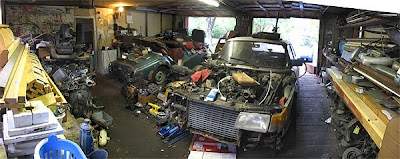What would you do if you inherited not simply a houseful of hoard, but an entire junkyard? (To read Part 1, click
here.)
Thalia and her sister Tara have been blogging about their experiences cleaning up their father's junkyard - and garages - and work areas - since June 2010.
The shows you may see on TV focus mainly on two things: a kind of train wreck fascination with the visual scope of the (worst) hoards covered, and the anguish the hoarder endures trying to give up any little piece of his/her "treasure."
What is rarely touched upon is what growing up in a hoard does to the children. How does it impact them socially? Do they inherit the distorted thinking that "there's a use for that," for
everything? Are they angry, hurt, confused?
Thalia of
Tetanus Burger, for whom I hold more admiration for her courage and raw honesty than I can ever express in words, agreed to this e-interview in hopes of shedding a little more light on this issue. To help those children and teenagers who are even now living with a hoarding parent, and wondering if something is wrong with
them.
***
4) Let’s talk about OCPD, the need to control not only oneself, but one’s entire environment and inner circle of family. I’ve blogged here before about being lectured by my ex because I left the shower doors six inches from the wall to air out after a shower, and they were supposed to be eight. (Or was it the other way around, lol?) You’ve posted about some of the things your father did to control your household, like post a sign on the wall directing how you should do laundry. But it wasn’t just signs, I’m sure. What happened around your house if the rules were broken?
I don't honestly know how to answer that. We weren't punished, not overtly anyway; they didn't spank us (except when we were really young), or even ground us (and in high school I was out sometimes till four in the morning on a school night). I'm not sure what the hold my father had on us was. It was just the way things were done.
When I was a kid and reading fairy tales I remember once in a while coming across one that was new to me, which had rules that contradicted what other fairy tales' rules were. I remember almost freaking out at that—how was I supposed to know what to do if the rules were different? I couldn't see the underlying patterns behind them, which I can now, things like be kind and compassionate, help the unfortunate, be true to your voice. It was just all about the rules. And I don't even remember most of those rules, so I can't even tell you what they were.
That's the thing about growing up with a lot of invalidation; your memory is both damaged and discounted from within. So I can't answer that, except to say that my father sure yelled a lot, and would always scream about how he paid for whatever it was and how that gave him control. So I guess the underlying threat was that he wasn't going to pay for it, and then what? We'd starve even more? Freeze even more in the winter? Be even more miserable?
When I was a child—a
child—I had recurring dreams about living in a totalitarian dictatorship, usually under the Nazis, who were always watching everything I did. The only thing I could think to do in those dreams was to hide, which is I guess pretty much what I did in real life too. What kid dreams of Nazis? I remember seeing, not too long ago, a tv movie on the Warsaw ghetto, and one of the characters, a Jewish woman, was out doing something against the rules, something to do with the freedom fighters. She was walking out on the street trying to look like she wasn't doing anything 'bad' with Nazis all around just looking for an excuse to harass her or worse. I recognized the look on her face as one I must have worn most of my childhood.
My father's need for control was so ubiquitous I couldn't even see it. Still can't. There is a thread on the Television Without Pity forum discussing the
Hoarders TV show; here and there they mention Tetanus Burger and I read it having Googled my way there. It is astonishing to me that they talk about my father there a little and call him an absolute control freak, just a miserable asshole. It is good to hear, but in so many ways I still can't see it myself.
5) Currently, many hoarding sites primarily reference OCD as associated with hoarding, not OCPD, and there is talk that the new DSM-5 will put hoarding in its own separate category. You’ve written that you believe your father to have OCPD, and there is overwhelming evidence that he hoarded. I believe my ex to be an OCPDr who hoards also, regardless of whether “they” decide they’re interwoven together, or two separate disorders. What has been your experience and thought process in learning about your father’s mental disorder(s)?
My father absolutely and without question was a hoarder; the overwhelming evidence is that he had OCPD (as diagnosed-by-proxy by two separate therapists of mine now). It is not, really, about belief at this stage, or that maybe I'm wrong. Because I'm not. And honestly, in downplaying my experience and what I have concluded about it, I hear you downplaying your own. You may want to think about that; I have noticed you have a tendency to side or sympathize with the abuser, usually in the guise of needing to be fair to them too (which is crap) which is why I am being so picky about the way you worded that.
I don't know where the OCD thing came from; cynical me says that it's a lot easier to get sympathy for someone with OCD than it is for someone with a personality disorder (which, don't forget, also includes sociopathy and narcissism) and so that's how people like
Frost and Steketee have framed it. I don't personally buy the OCD angle all that much. Because OCD is something the person is aware of, and the person with it usually sees it as not quite right and so they actually want to do something about it.
Whereas so many hoarders, from my own experience and what I have heard hanging out with other children of hoarders, see nothing whatsoever wrong with their behavior, or if they do (for example if they are ashamed of it or try to hide it somewhat, which implies that they do know something isn't quite right) they seem to have no concept whatsoever that what they are doing is harming others.
I do think that hoarding is one of those things that probably has a lot of different causes, OCPD being one of them (and there also seems to be an awful lot of narcissism involved from what I've seen); but I do think OCPD in relation to hoarding is very overlooked. But then there are only a couple of 'experts' on hoarding and I can't say I'm very impressed with them.
My experience and thought process? Describing my father to that first therapist, she did put it together that it sure sounded like OCPD; but at the time I didn't really understand what that meant. It's only recently, really, which means, since my father has not been here, in my face, in my life, that I can see a little more clearly, and so I have been able to start putting things together and researching a bit about OCPD and other personality disorders.
6) Your elderly father is now mentally incapacitated, which has allowed you and Tara to begin this massive clean-up effort. Your mother still lives in your childhood home, as does your sister. I imagine your feelings about your parents must be mixed. Care to share about them, or not?
Actually no Tara does not live here in the childhood home; it's myself and my mother (and an awful lot of kittens right now). I will say that, yes, definitely, my feelings towards my mother are mixed (about my father they are not particularly 'mixed' at all; he was a bastard).
My mother certainly has some issues of her own which are not minor and which I am only able to see now that my father's blindingly obvious dysfunction is no longer outshining everything else.
I always thought my mother fought for us and that she was not an enabler, as they say; but now I don't know. I don't want to get into it much more than that, though it has certainly been very much on my mind recently and is perhaps the most present bit of dysfunction I have to deal with.
(to be continued...)
***
I do soft-pedal the amateur diagnosis, on our parts, of OCPD for our loved ones, having had it drummed into me that
only mental health professionals can properly diagnose mental disorders (and sometimes even
they get it wrong).
Guilty as charged as to being mealy-mouthed in this question, and yes, to being sympathetic to those with OCPD. Having come to know a fair number of people with OCPD in the last few years, as well as their partners and children, I
know that people with OCPD are sick, not monsters.
Does that in any way minimize the damage they inflict on spouses, love interests, children, and co-workers? Hell no! In fact, (as Thalia has pointed out to me),
too sympathetic an attitude can enable this disease, making it worse not just for those who live with an OCPDisordered person, but for the person with OCPD, him/herself.
Yet, my goal here on this blog is to not only learn to heal, personally, but to help others who are also recovering, and not to demonize people
with OCPD, but
the illness itself. I would love, someday, for OCPD to be known as well as Bi-Polar Disorder, Schizophrenia, and the "sexier" mental disorders that get all the press, and for the people who have it to get the help they need.
That said, I do not want to discount in any way Thalia's experience, or the experience of anyone else growing up with an OCPD parent, or who spent years with an OCPD partner.
There is damage and pain that will take years to heal - if it ever does.
Two things you can do right now, Dear Reader:
1) Add a comment to show your support for Thalia and her incredible courage in opening up about this very painful and difficult subject.
2)
Download this attached .pdf prepared by
Children of Hoarders. It would be great if COH was a big, well-known organization with bucketfuls of money, who could afford to print out multiple copies and leave them in places like schools, pediatricians' offices, and youth recreational facilities - anywhere a child of a hoarder might find one, and realize s/he is not alone.
For now, they are asking for volunteers, to please print out what copies you can afford, distribute them where you can. Visit the COH site and make a donation, if you can. And
pass the word.
Thank you. Stay tuned for Part 3, tomorrow. (For Part 1, click
here.)

















